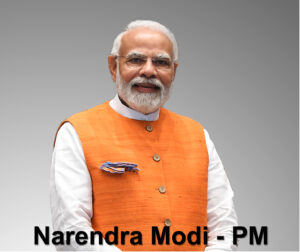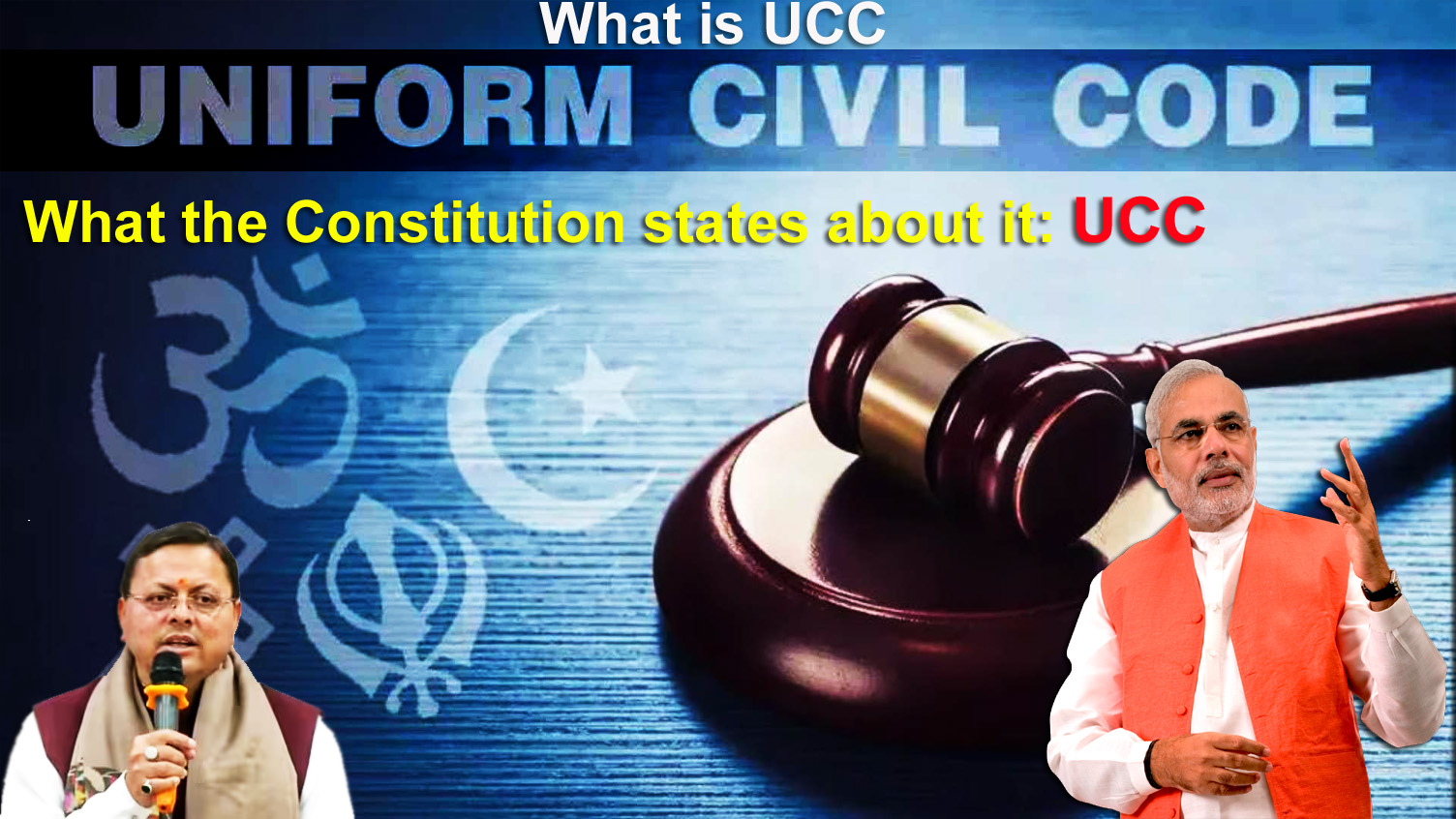UCC Full From- uniform civil cod:
What is Uniform Civil Code (UCC)?

A single set of civil laws that would apply to all individuals, regardless of their religious views, is called a Uniform Civil Code (UCC). Personal rules based on religious practices that regulate things like inheritance, divorce, and marriage would be replaced by this code. The goal is to guarantee equality and get rid of discrimination in personal concerns based on religion. In nations like India, where many religious communities have distinct personal laws, the idea has been discussed. Critics voice concerns about possible restrictions on religious freedom and cultural variety, while proponents of equality make their case. Although the concept is stated in Article 44 of the Constitution’s Directive Principles of State Policy, it has not been put into practice in India.
LONG Definition and Meaning:
A Uniform Civil Code (UCC) is a proposal to substitute a single set of rules that apply to all citizens, regardless of their faith, for individual laws based on religious texts and customs. A unified body of civil laws is intended to regulate a variety of issues, including adoption, divorce, inheritance, and marriage. Promoting equality and doing away with prejudice based on religion in private affairs are the objectives.
The idea of a Uniform Civil Code has been discussed and debated in numerous nations, including India. Personal laws have been in place in India for a variety of religious communities, including Hindu, Muslim, Christian, and others. This has led to a variety of legal norms for people who practice different religions.
A uniform civil code, according to its proponents, would guarantee all people a common set of rights and obligations, thereby advancing equality and justice. However, detractors contend that respecting cultural and religious variety is important and voice worries about possible violations of religious freedom.
A Uniform Civil Code is recommended under Article 44 of the Directive Principles of State Policy in the Indian Constitution, but its implementation has proven to be difficult and has not materialized. One of the main focuses of the ongoing discourse on the relationship between personal laws, religious practices, and constitutional principles is the Uniform Civil Code.
Read More:
- budget 2024: Expectations New income tax regime, and income tax slabs
- Land for Job scam case: rjd lalu prasad yadav, Today Tejaswi’s, 2004-2009
- Bilkis Bano News, bilkis bano gujarat -11 Convicts’ Remission in the Bilkis Bano Case Is Set Aside by the Supreme Court
What the Constitution states about it:

Prime Minister Narendra Modi’s recent remarks in the run-up to the Madhya Pradesh elections have rekindled interest in the Uniform Civil Code (UCC) and brought it back to the forefront of political conversation. In addition to stressing that the Uniform Civil Code is an essential component of the Constitution, Prime Minister Modi declared that India cannot operate under two separate legal systems.
“People are being incited today in the name of UCC,” he said. How can two (laws) govern the nation? Equal rights are also mentioned in the Constitution.The Supreme Court has requested the application of UCC. These opponents are engaging in vote-bank politics.”
As state elections draw near, the Prime Minister’s remarks have triggered a national conversation in which a number of opposition politicians have accused him of manipulating the UCC issue for political advantage. Specifically, Congress lawmakers charged PM Modi of using the UCC as a gimmick to deflect attention away from urgent problems like unemployment, inflation, and the Manipur situation.
All India Majlis-e-Ittehadul Muslimeen (AIMIM) president Asaduddin Owaisi expressed his disapproval of the prime minister, saying, “India’s PM considers India’s diversity & its pluralism a problem.” Thus, he says things like this. Perhaps the Prime Minister of India is ignorant of Article 29. In the name of UCC, are you going to eradicate variety and pluralism from the nation?”
Roughly thirty tribes have voiced their worries, saying they are worried that the Uniform Civil Code may weaken their traditional rules. Prem Sahi Munda, head of Adivasi Jan Parishad, said, “We oppose the UCC for a number of reasons. We worry that UCC would have an impact on two tribal laws: the Santhal Parganas Tenancy Act and the Chota Nagpur Tenancy Act. Tribal lands are protected by the two statutes.
It’s important to remember that the BJP promised to enact the UCC if it won the 2019 Lok Sabha election. The idea of a Uniform Civil Code in India is surrounded by a complex convergence of political, legal, and cultural factors, as seen by the continuous discussions and arguments.
UCC Part of the Indian Constitution?
The 4th part of the constitution specifically mentions the Uniform Civil Code, giving the state the mandate to “endeavour to secure for the citizens a uniform civil code throughout the territory of India.” The framers of the Constitution anticipated that old personal rules from different religions would give way to a uniform legal system that would handle issues like adoption, divorce, marriage, and inheritance. The Directive Principles of State Policy, which are important in directing national governance even though they are not legally enforceable or subject to judicial review, include the Uniform Civil Code.
Regarding UCC, what is the Supreme Court saying?
The Supreme Court has stressed the necessity of enacting a Uniform Civil Code (UCC) in a number of decisions. One famous example was the 1985 Mohd. Ahmed Khan v. Shah Bano Begum case, in which a Muslim woman who had been divorced asked her former husband for maintenance. The Criminal Procedure Code (CrPC) or Muslim personal law: which should be adopted first? The Supreme Court recommended adopting the UCC.
This demand for UCC implementation was reaffirmed by the court in the Sarla Mudgal ruling of 1995. Another instance was the Supreme Court’s 2019 advocacy for the creation of a Uniform Civil Code in the case of Paulo Coutinho v. Maria Luiza Valentina Pereira. These cases highlight the judiciary’s steadfast position that personal laws must be governed by a common civil code in order to ensure equality and uniformity amongst various faith sects.
What number of states in India have a Uniform Civil Code?
An effective illustration of a uniform civil code is the Goa civil code, which has its roots in Portuguese culture. Portugal established a civil code in 1867 and expanded it to include Goa and other foreign provinces in 1869. The Goa Civil Code is complicated to apply, even with its historical basis.
The Uttarakhand administration made a big move when it announced in May of the previous year that it intended to implement the Uniform Civil Code throughout the state. In order to make this easier, Desai formed a group consisting of five members to create a plan for the implementation of UCC. Pushkar Singh Dhami, the chief minister, has underlined that the committee is expected to deliver its report by June 30 of this year.
Other states are in agreement with this initiative. The Uniform Civil Code must be adopted in the state, according to Assam Chief Minister Himanta Biswa Sarma, who has emphasized the code’s significance in providing justice to Muslim women. In a similar vein, the administration of Gujarat has shown support for the Uniform Civil Code.
A concise synopsis of the most important financial points is given in a clear and concise 3-minute summary of Finance Minister Nirmala Sitharaman’s Budget address.
FAQ’s –Questions Ans. GK
- Uniform Civil Code (UCC) Definition:
- A proposal to replace individual laws based on religious texts with a single set of rules applicable to all citizens.
- Aims to regulate various personal matters, including adoption, divorce, inheritance, and marriage.
- Current Scenario in India:
- India has personal laws for different religious communities, leading to varied legal norms.
- Proponents argue that a UCC would ensure equal rights and justice for all citizens.
- Detractors express concerns about potential violations of religious freedom and emphasize the importance of cultural and religious diversity.
- Constitutional Mention and Supreme Court’s Position:
- Article 44 of the Directive Principles of State Policy in the Indian Constitution recommends a UCC.
- The Supreme Court has emphasized the need for a UCC in various rulings, advocating for a common civil code to ensure equality among different faiths.
- Recent Political Developments:
- Prime Minister Narendra Modi’s recent remarks highlight the UCC as an essential component of the Constitution.
- Opposition politicians accuse Modi of using the UCC issue for political gain, diverting attention from pressing issues like unemployment and inflation.
- Diverse Perspectives:
- Critics, such as AIMIM president Asaduddin Owaisi, argue that the UCC may undermine India’s diversity and pluralism.
- Tribal communities express concerns about potential impacts on their traditional laws protecting tribal lands.
- State Initiatives:
- Goa’s civil code serves as an effective illustration of a UCC.
- Uttarakhand and other states express interest in implementing the UCC, citing its significance in ensuring justice, especially for women.
- BJP’s Promise and Ongoing Discussions:
- The BJP promised to enact the UCC if it won the 2019 Lok Sabha election.
- Ongoing discussions and arguments demonstrate the complex interplay of political, legal, and cultural factors surrounding the UCC in India.
